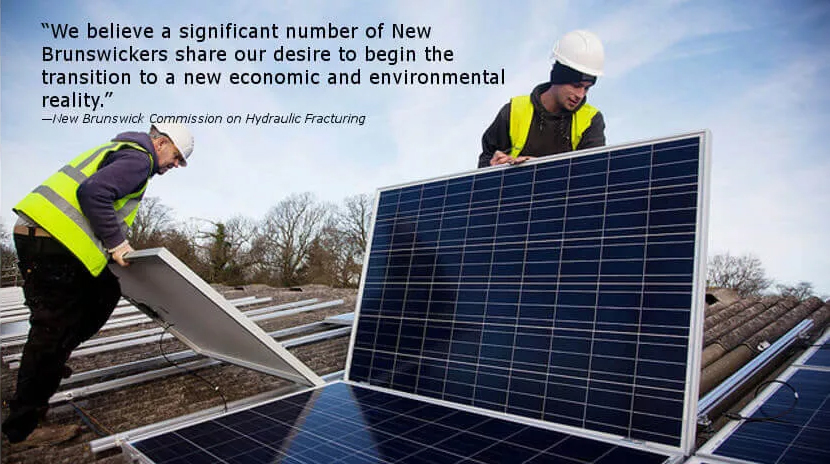FREDERICTON — The report released today from the New Brunswick Commission on Hydraulic Fracturing provides more evidence that the provincial government made the smart policy decision by putting a moratorium in place and throws down the gauntlet for N.B. to start the transition to a thriving low-carbon economy.
Consider what the Commissioners say in their report:
-
The challenge and opportunity for economic development today is in clean and low-carbon technologies as governments across the world — including New Brunswick — prepare to deal with the opportunities and challenges of climate change. The Commissioners say New Brunswick must transition away from the old-world economies of resource extraction into a new value-added and knowledge-based era driven by new forms of energy, stating: “The world is shifting towards integrated energy systems that will be supported by a variety of advanced technologies, most of which will not require fossil fuels.”
-
The environmental protection and energy regulatory system in New Brunswick is prone to conflicts of interest. The Commissioners highlight significant gaps in the current framework, such as the lack of understanding and mapping of our groundwater system, and highlight pieces that are broken entirely, such as the failure of the Water Classification regulation for protecting rivers and streams. The current approach means a government department has to have two heads, meaning ministers serve two masters — one that promotes energy projects and another that regulates them. This system leads not only to confusion, anger and distrust but also creates too many unanswered questions, especially with respect to the cumulative effects of energy projects on water, air and public health.
-
Nation-to-Nation communication with First Nation communities is sorely lacking and needs years of repair and capacity-building for all involved.
“The Commissioners rightly point out that the world shifted with the signing of the first universal climate agreement and that the real opportunities for jobs and economic growth comes from clean energy and energy efficiency,” says Lois Corbett, Executive Director of the Conservation Council of New Brunswick. “The economic case for renewables grows stronger every month and energy efficiency has long been recognized as a tool for creating jobs and keeping electricity affordable.”
Corbett continued: “It’s clear from the Commissioners’ report that New Brunswick’s regulatory and oversight system is prone to conflicts of interest and is at best years away from being ready to handle shale gas development. If we spend 90% of our effort and New Brunswickers’ ingenuity focused on building the clean energy transition then we’d all be much better off than continuing an endless conversation about fracking.”
Corbett concluded: “The moratorium was the smart public policy decision in 2014 and it remains the right public policy well into the future. The Commissioners outline the crossroads our province — and the world at large — is facing, and it’s hard to imagine a future for new shale gas development in a world committed to protecting our families from climate change. Our best bet for creating jobs right now in New Brunswick is through energy efficiency and clean power technology. That’s the road we need to take, and it’s the road that doesn’t put our drinking water or communities’ health at risk.”
—30—
Read our full statement.
The report will be available on the Commission’s website.
Read the submissions the commission received from groups and individuals here.
To arrange an interview, contact: Jon MacNeill, Communications Director. Office: 458-8747; Cell: 261-1353; Email: jon.macneill@conservationcouncil.ca

